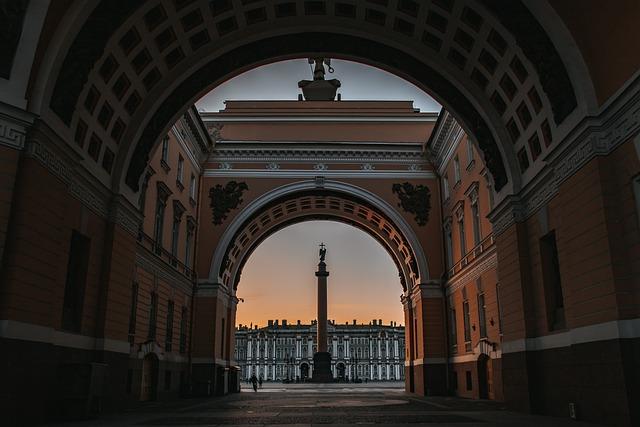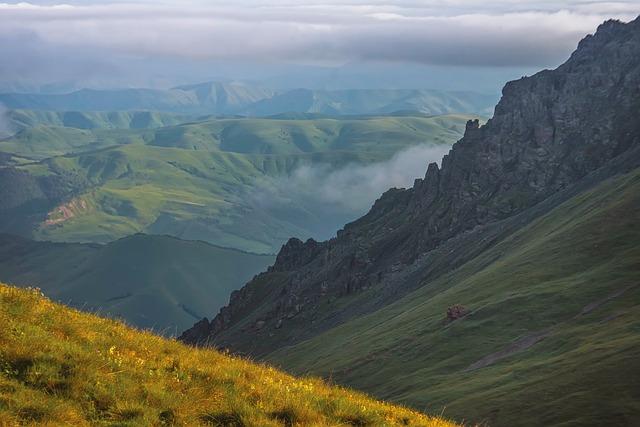In a significant progress in international relations, Russia has articulated that any efforts to normalize ties with the United States are contingent upon the removal of economic sanctions imposed on Moscow.This assertion, reported by Reuters, highlights the ongoing tensions between the two nations, which have been exacerbated by a range of geopolitical conflicts and diplomatic sanctions over the past several years. As both countries navigate this complex landscape, the Kremlin’s stance underscores a critical juncture in U.S.-russia relations, where economic measures are intertwined with diplomatic engagement. This article delves into the implications of Moscow’s position,examining the potential pathways for reconciliation and the broader context of their strained relations.
Russia’s Stance on US Sanctions and the Path to Diplomatic Normalization
Amid ongoing tensions, Russia has firmly stated that any effort to normalize relations with the United States hinges on the lifting of economic sanctions imposed over the past several years. Moscow’s officials argue that these sanctions have not only stifled Russia’s economic growth but have also hindered constructive dialog between the two nations. They believe that a mutually beneficial relationship can only be established when the barriers created by these sanctions are removed. Officials have highlighted the need for both parties to focus on cooperation in several critical areas, including:
Global Security: Ensuring peace and stability in conflict zones.
Trade and Economic Relations: Developing extensive trade agreements that benefit both economies.
Cultural Exchanges: Fostering understanding through people-to-people connections.
Furthermore, Russian leadership has articulated a broader vision for international collaboration that includes addressing pressing global challenges, such as climate change and terrorism. In light of this, a change in the U.S. stance coudl pave the way for renewed diplomatic efforts. Simultaneously occurring, public sentiment in Russia reflects a mix of skepticism and cautious optimism about reaching a breakthrough. This complexity is illustrated in the table below, summarizing public opinion on sanctions and diplomacy:
Public Opinion
Percentage
Support for lifting sanctions
66%
Belief in diplomatic progress
45%
Concern over isolation
75%

The Impact of Sanctions on Russia’s Economy and Global Relations
The ongoing sanctions imposed on Russia have significantly altered its economic landscape, leading to a series of challenges that ripple through various sectors. Key industries such as energy, finance, and technology have faced major restrictions that hinder access to international markets and investment. This has resulted in a decline in foreign direct investment, a decrease in the value of the ruble, and increased inflation affecting everyday life for Russian citizens. Many businesses have struggled to adapt, often pivoting towards local supply chains but facing limitations in technology and expertise. the economic isolation has not only impeded growth but has also raised the specter of long-term stagnation.
Moreover, the geopolitical ramifications of these sanctions extend beyond Russia’s borders, impacting its relationships with other countries. Nations such as China, Iran, and Turkey have stepped in as alternative partners, fostering new alliances that may reshape global trade dynamics. Though, this pivot carries risks, as deeper ties with non-western countries frequently enough come with political strings attached. The evolving landscape raises critically important questions regarding diplomatic engagement and the likelihood of any future normalization of relations with western nations. Ultimately, the sanctions serve as a double-edged sword, affecting not only Russia’s economy but also its strategy on the world stage.

Key Areas of Potential Collaboration Between Russia and the United States
The landscape of diplomacy between Russia and the United States has always been complex, yet certain key areas offer fertile ground for collaboration, possibly paving the way for improved relations. These areas include:
Counter-terrorism efforts: Both nations face significant threats from extremist groups, making it imperative to share intelligence and resources.
Nuclear non-proliferation: Joint efforts in controlling nuclear arsenals and preventing the spread of nuclear weapons can bolster global security.
environmental initiatives: Addressing climate change through collaborative projects can establish mutual benefits and show goodwill between the two powers.
Space exploration: Enabling cooperation in outer space research could unite scientific communities and enhance international prestige.
Furthermore,economic and technological exchanges can bolster collaboration,new avenues in trade and investment may emerge once sanctions are lifted. A potential table summarizing these sectors could provide clarity:
Sector
Potential Benefits
Energy
Shared technology and resources to enhance energy security.
agriculture
Increased food security and shared agricultural technology.
Cybersecurity
Mitigating cyber threats through collaborative frameworks.
Public Health
Joint research initiatives can combat global pandemics.

Challenges and Opportunities in Lifting Sanctions: A Comprehensive Analysis
The discourse surrounding sanctions and international relations is fraught with complexities.Lifting sanctions on moscow not only presents opportunities but also introduces significant challenges.Among the key considerations are:
Economic Implications: Removing sanctions could potentially revitalize economic ties, benefiting sectors such as energy and trade.
Geopolitical Stability: Addressing underlying issues can lead to a more stable global surroundings, reducing tensions in conflict zones.
Domestic Political Reactions: There is a risk of backlash within both countries; critics may argue that lifting sanctions could be construed as a reward for negative behaviors.
Human Rights Concerns: Ensuring that progress is made in human rights before any sanctions are lifted may be essential for long-term stability.
On the flip side, the intricacies of sanction diplomacy cannot be overlooked.Careful negotiations will be essential to navigate the following challenges:
Verification Mechanisms: Establishing effective processes to verify compliance with agreed conditions may prove to be a daunting task.
International Reactions: Other nations’ responses to a U.S.-Russia rapprochement could lead to shifts in alliances and heightened tensions elsewhere.
Long-Term Strategy: It is indeed crucial to develop a comprehensive strategy that considers future implications and does not merely address immediate concerns.
Opportunity
Challenge
Increased trade relations
Geopolitical backlash
enhanced cooperation on global issues
verification complexities
Potential economic growth
Bipartisan domestic opposition

Recommendations for a Balanced Approach to US-Russia Relations
The intricacies of US-Russia relations demand a nuanced understanding and approach, particularly when considering the ongoing sanctions imposed on Moscow. Addressing these complexities requires a multi-faceted strategy that acknowledges the concerns of both nations while working toward establishing a constructive dialogue. Key recommendations include:
Phased Sanction Relief: Gradually lifting specific sanctions tied to tangible progress in diplomatic talks could create a foundation for cooperation.
Trust-building Measures: Initiatives such as joint cultural exchanges and scientific collaborations may enhance mutual understanding and reduce tensions.
Security Dialogue: Open channels for discussions on arms control and cybersecurity can definitely help mitigate fears and foster a sense of security.
Third-Party Mediation: Engaging neutral countries as mediators might help facilitate discussions and propose creative solutions to contentious issues.
In addition, tracking public sentiment on both sides is essential to guide policy decisions and foster acceptance of any agreements reached. A concise overview highlighting public opinion variations can serve as a reference point for policymakers:
Country
Positive Sentiment Towards Engagement
Concerns about Russia
United States
38%
62%
Russia
45%
55%
Implementing these strategies will demand commitment and adaptability from both governments, but the potential for a cooperative future hinges on the ability to engage meaningfully and resolve existing differences.

The Role of International allies in Facilitating Sanction Relief and diplomacy
The intricate web of international relations often hinges on the support and intervention of allies, particularly when it comes to matters of sanctions and diplomatic engagement. In the case of Russia, the path toward improving its relationship with the United States is intricately linked to the stance taken by its allies. Considerations include:
Leverage in negotiations: Allied nations can serve as intermediaries, facilitating dialogue and negotiations that may lead to a reevaluation of sanctions.
Economic Support: Allies that maintain stronger economic ties with Russia can advocate for relief measures, emphasizing the benefits of cooperation over isolation.
Global Consensus: A coalition of like-minded countries can present a united front,pressuring the U.S. to reconsider its position on sanctions.
Moreover, the success of sanction relief is often predicated on mutual interests and the strategic objectives of both sides. A potential framework for negotiation might include:
Element
Description
Timing of Lift
Phased removal of sanctions corresponding with specific diplomatic milestones.
verification Mechanisms
Establish clear oversight protocols to monitor compliance and ensure accountability.
Broader engagement
Integration of economic, cultural, and environmental collaborations to foster a comprehensive partnership.
The Way Forward
Russia’s stance on the normalization of relations with the United States underscores the complex interplay of diplomacy and economic constraints that defines current international relations. The Kremlin’s insistence on the lifting of sanctions as a prerequisite for improved ties highlights the enduring impact of these measures on bilateral engagement. As both nations navigate a path forward, the dialogue surrounding sanctions and political reconciliation will be pivotal in shaping future interactions. The implications of this diplomatic tug-of-war extend beyond the two countries, influencing global geopolitics and the stability of international alliances. Moving forward, stakeholders on both sides will need to assess the balance between national interests and the prospects for a more cooperative relationship.As these developments unfold, the international community will undoubtedly be watching closely, hoping for a resolution that could herald a new chapter in U.S.-Russia relations.
The post Russia says normalising ties with US will require lifting sanctions on Moscow – Reuters first appeared on Capital Cities.
Author : Capital-Cities
Publish date : 2025-03-07 03:56:27
Copyright for syndicated content belongs to the linked Source.